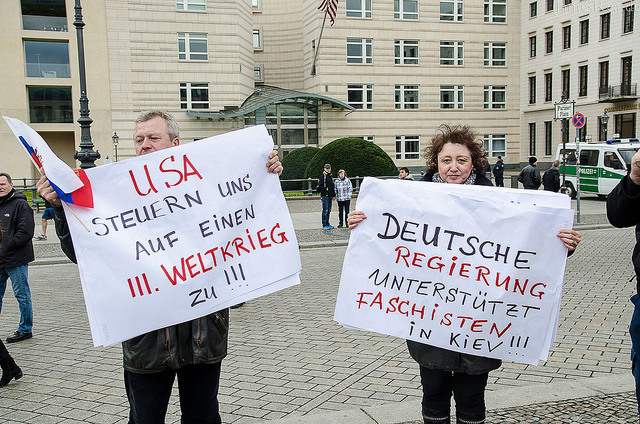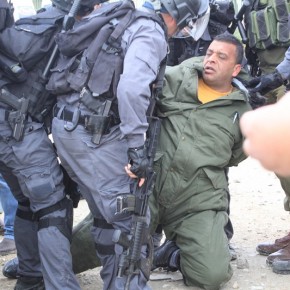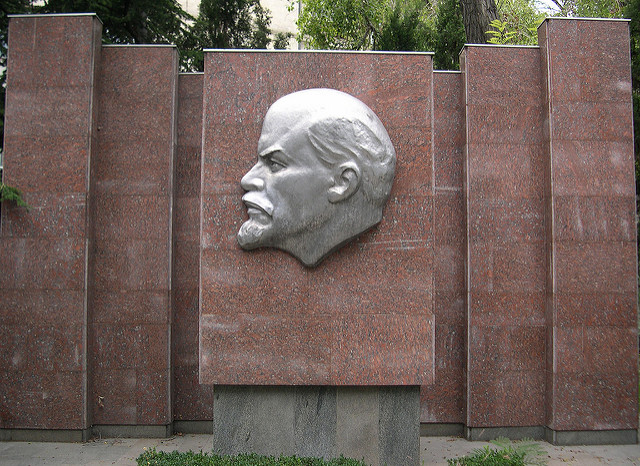‘When talking about Ukraine, the Western left rarely talks about the Ukrainians’. These words, spoken by a Ukrainian expatriate in London, have resonated since the start of the crisis, as those of all political sympathies or none have formed convictions and preconceptions on where they should stand.
The novelty of a Russian leader whose ‘anti-hegemonic’ and ‘anti-globalist’ statements address deep – and merited – criticisms of neoliberalism and decades of military escapades – is comforting for the left in a precarious and pessimistic Europe.
The lived experiences of both Russian political dissidents and Ukrainians are ignored, their agency dismissed, as a chessboard caricature of geopolitics controls the narrative. Yet it is neither original nor iconoclastic to smear the European left with ‘useful idiocy’ in its approach to the crisis in Ukraine – especially given the political convictions of the accusers.
While the Guardian‘s Seumas Milne praises Putin as a crucial counterbalance to US hegemony, Anne Applebaum seemingly advocates ‘shock therapy’ for Ukraine in an interview with Hromadske. There is little genuine introspection as to what has led Western European audiences to be so receptive to the ‘anti-globalist’ message of RT. Similarly, Russian finance in the City of London as a lever of influence is a nefarious Russian plot rather than the result of deregulated finance. By portraying Russian influence in Europe as exclusively the result of premeditated, baroque schemes, the loudest critics of the Kremlin’s policies inoculate themselves against meaningful structural criticisms of their own societies. All criticisms of Putin in this emerging binary uphold Western status quos. This is Ukraine in half-sentences.
The position of prominent writers on the Western left, such as the Guardian’s Seumas Milne and Simon Jenkins, can be seen in part as continuing the intellectual heritage of parts of the western “anti-imperialist” left’s reluctance to criticise Serbian leader Slobodan Milosevic in the 1990s. This position – advocated by leftwing intellectuals such as the late playwright Harold Pinter and which unpinned the court case between ITN and ‘Living Marxism’ magazine – held that Milosevic was being unfairly demonised as he took a stand against Western imperialism and America’s global hegemony. But while this position may have developed from the understandable resistance on the left to military interventions, on the level of political discourse the position also entailed, for theses apologists of Milosevic, ignoring and sidelining the voices of Serbian dissidents and activists, both in Otpor and in other movements pushing against Milosevic’s authoritarian and violent regime. It was a basic failure to read where power lay in the situation and to empathise with the powerless: the millions of Serbians who suffered under Milosevic’s rule and the millions of people in neighbouring countries who suffered from the exclusivist nationalism stirred up by the region’s political elites.
A similar dynamic has played out in the increasingly divergent conversations happening in the West since the start of the popular protests in Ukraine in 2013. The voices and demands of the Ukrainian people themselves are frequently lost in the conversations taking place in Western public life. Little space seems to have been carved out between – on the one hand, conservative ‘realists’ like Applebaum warning of the dangers of Putin to the west and advocating for increased Ukrainian “nationalism” as a bulwark against Russia’s ambitions, and, on the other hand, a contrarian reading of the situation along the lines of Milne (or Pinter in the 1990s on Serbia) in which an enemy-of-my-enemy position forces those who would normally advocate for human rights, solidarity, and people power to apologise for Putin’s authoritarianism. The ‘realist’ idea of ‘stirring nationalism to fight nationalism’ has frightening echoes of the experience of the Balkans in the 1990s, whilst the ‘contrarian left’ idea of supporting an authoritarian as long as the authoritarian leader in question is anti-American is both intellectually infantile and does a disservice to those struggling against their authoritarian leaders.
Several fundamental things are lost in the current intellectual landscape of Western thinking on Ukraine and Russia. The first is that the left-leaning ‘contrarian’ position (and the conservative ‘realist’ position likewise) denies the agency of the Ukrainian people, and the demands they articulated through the popular protest movement of 2013 and 2014, consigning them to footnotes in a global power play, rather than recognising their full humanity as actors who sought a socially just state and an end to Yanukovych’s atrophying corrupt and authoritarian rule.

This patronising denial of the agency of the Ukrainian people themselves as merely ‘puppets’ of the West is mirrored in much of the Western media’s treatment of Ukraine, in which non-expert generalists and ‘foreign policy analysts’ are given a platform over local expert voices who are more able to articulate the reality of the political situation in Ukraine in all its complexity (including articulating the real frustrations and sense of neglect felt by many in the Donbass region, which fuelled support for the Donetsk People’s Republic and Luhansk People’s Republic). There is an unresolved dissonance in the fact that the anti-imperialist left who cheered the youth of Egypt, Tunisia, Libya, Bahrain, Yemen and elsewhere in the Arab world in 2011 for their often-dangerous struggle against their corrupt and authoritarian leaders did not bestow the same support to the popular protest movement against Yanukovych in Ukraine in 2013-2014.
As such, perhaps a more pertinent criticism than the fact that the contrarian left position of Milne and others isn’t fair to Ukrainians is the fact that, arguably, it also isn’t very “left.” The principle of solidarity is a cornerstone of European leftist thought as much as the principle of anti-fascism, yet this principle – of standing in support with those struggling against injustice elsewhere, and elevating their voices so they can articulate their own reality – seems to have been discarded in the case of Ukraine because the geopolitical dimension is seen to take precedence.
This also leaves those among the Western left who do wish to stand in solidarity with Ukrainians with some awkward bedfellows of their own: the conservative foreign policy ‘realists’ who would like to assist Ukrainians – but by instrumentalising them in a struggle by proxy against Putin, with little genuine regard for their future and well-being. The conservative realists – with their seeming endorsement of Chicago School-style economic ‘shock therapy’, and comfort with the idea of stirring ‘defensive’ ethno-nationalist or ethno-linguistic tensions where these were previously not salient identity fault-lines – are throwing Ukrainians under the bus as much as the Putin-apologists on the left.
The ideology-gymnastics of this current intellectual landscape has led to a number of false binaries, which anyone wishing to genuinely empathise with Ukrainians – and Russians – as people not as geopolitical pawns must work to unpick. The alarming reluctance to criticise Putin in some strands of the left actually coexists comfortably with cultural Russophobia (and a more general cultural Slavophobia) which, as Natalia Antonova recently outlined, ignores the voices of Russians in their complexity and humanity, to the benefit of both Putin and the status quo in the West.
The appropriation of the conflict currently tearing through lives in Ukraine (as sanctions and the economic crisis are tearing through the lives of ordinary Russians) by political actors and analysts has mutated language to the point that reasoned, empirical analysis and clear-headed assessments of the dynamics of the situation have been subordinated to exclusivist narratives by those seeking the sledgehammer the Ukrainian crisis into their pre-existing ideological moulds. This has played out in everything from filmmaker Oliver Stone’s assertion that the Ukrainian revolution was a CIA plot (thus erasing the Ukrainians who struggled and died to overthrow Yanukovych) to the loaded and disingenuous use of the phrase ‘fascist’ by anti-imperialist left writers such as Milne. The empirically documented existence of a small far-right presence in Ukraine (which is a reality, and a concern, although arguably far less of a threat than the far-right’s presence in the Hungarian political landscape, a topic upon which anti-imperialist left writers have been comparatively silent) is a fact that has become detached from the loaded language of ‘Ukrainian fascism’ in discourse by those who wish to dismiss the concerns expressed by the mass protests of Euromaidan.
Honest discussion of the Ukrainian far-right does not begin and end with the Azov Battalion, but neither is the topic’s use in understanding the complexities of the conflict is inexhaustible. Akin to the use of the term ‘Ustaše’ as a loaded (perhaps, hate-fuelled) word against all Croatians in the 1990s Balkan conflicts, the political capital of labelling others as ‘fascist’ co-exists with but remains ultimately unconcerned with the actual self-identifying far-right presence (who, in Ukraine, received a negligible percentage of the vote in the 2014 elections,) in favour of disingenuously appropriating and stirring up the unhealed collective memories of the twentieth-century in a country that has not had the space enabled by pluralism to come to terms with its past.
The attitude of smaller sections of the ‘anti-hegemonic’ European left to the Donetsk and Luhansk People’s Republics has been no less perplexing. When valid criticisms arise of their governance (or lack thereof), they are at first dismissed, and then ignored. By virtue of their role in the presumed global ‘anti-hegemonic’ struggle, they are seen as progressive. The seizure of assets of a pro-Kyiv oligarch is interpreted as a wide-scale programme for economic ‘nationalisation’. Nuances of ideology are lost in translation, as the overlap of neo-Soviet nostalgia and symbolism with Russian state nationalism and irredentism is unappreciated. This may not be a ‘war between White Guards and Petlyuraites’, as one Ukrainian Marxist described it, but its interpretation abroad has been no less convoluted.
The voices of Russian political dissidents also present a conundrum to the European left. Alexei Navalny’s Russian nationalism and slurs against immigrants from the Caucasus and Central Asia represent a far greater current of Russian political activism than the Moscow or St. Petersburg pro-European liberal of caricature. To engage with the latter demands a degree of introspection on behalf of the European left, as they address many dissidents’ uncomfortable taste for ‘Western’ neoliberal capitalism and consumerism partly informed by their lived experience under Soviet socialism. Meanwhile, once lionised by Western media, the anti-patriarchal, feminist content of Pussy Riot’s message was obscured by their anti-government stance.
The conflict in Ukraine, and the Ukrainians themselves, are fertile ground for Western Europeans to project their own political desires. Such risky investment brings with it fear and humiliation. The fear could be that, in its ‘weaponisation of information’, in its ‘weaponisation of finance’, Russia is playing the West too well at its own game – neoliberal capitalism. The humiliation for ‘anti-hegemonic’ supporters of Russia will be the eventual realisation that a strategic challenge to the West does not entail a structural one to its economic and political systems. It is time for the half-sentences to be assembled into a complete story – one the Russians and Ukrainians are ready to tell us.
Photographs courtesy of James Rea. Published under a Creative Commons license.





